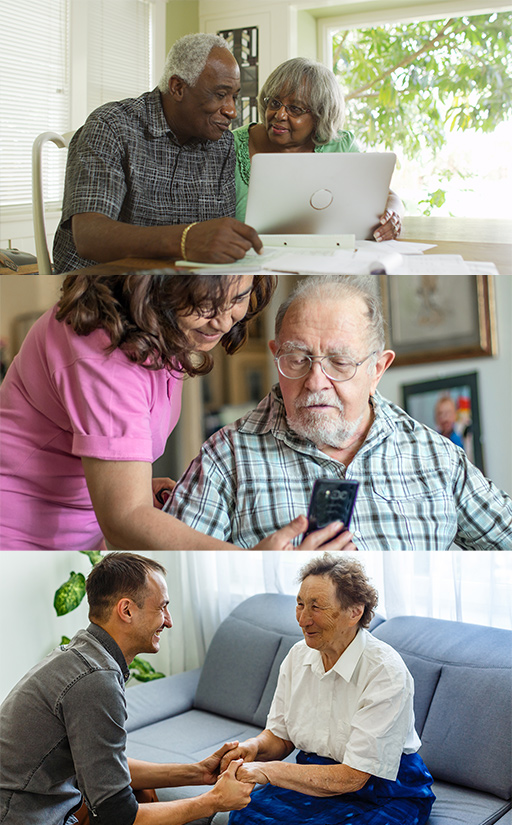Caregivers will complete six weekly 2-hour small-group virtual Zoom sessions led by trained facilitators.

How do I register?
Caregivers interested in attending the Workshops need an internet connection and access to Zoom. Caregivers can attend from anywhere.
This workshop teaches coping skills to deal with stress, burden and depression, as well as effective strategies to improve the caregiving experience and quality of life.
All sessions are led by a professionally trained facilitator (social workers, and health professionals). Caregivers will actively engage with each other and the facilitators during each session. Caregivers will complete practice exercises, discussions, and homework.
Caregiver TLC Workshop Overview
Strategies for Stress
The topic of this session is all about the management of stress. We’ll start with an examination of stress and how each person has a unique pattern of stress response. Then we’ll discuss the physical and mental consequences of chronic stress. You’ll learn two valuable yet simple stress management tools you can use at any time. At the end of this session you’ll create an action plan that will help you to plan for how to use these tools in your day to day life.
Dealing with the Blues
This session’s focus is how to deal with common depressive symptoms that caregivers often experience. We’ll discuss strategies how to manage mood more effectively, mainly by increasing everyday positive activities that have been proven to lift mood. Those you care for may also experience depressive symptoms. You’ll leave this session with different tips and strategies that can help you to help the person you are caring for.
Bouncing Back
This session explores the concept of resilience in caregiving. Topics include why resilience is important and will provide ways to increase a caregiver’s own sense of well-being. Participants create an Atlas CareMap – a visual representation of who is on their support team. The creation of the CareMap can provide insights into your own personal caring networks. You’ll leave this session with a draft of CareMap completed.
Filling the Well
Caregivers rarely devote time in their schedule to attend to their own self-care needs. This session will explore the importance of self-care, focusing on 4 areas (spiritual, physical, mental, and social) with special emphasis on getting regular exercise and getting a sound sleep. Development of individual self-care plans is encouraged.
Coping with Frustration
This session emphasizes that frustration, and at times anger, are understandable emotions, but they can get in the way of successful caregiving. Strategies for managing these feelings are taught, including learning to STOP and think before responding, and the need to walk away or take a break when necessary. Caregivers will leave with strategies they can practice at home when frustration or anger become overwhelming.
All By Myself
The focus in this session is on the loneliness and social isolation that are so common during this pandemic, along with recommended strategies for reducing them. We’ll explore different ways to find support on the internet. Tips and strategies are shared to increase compliance with COVID recommendations that can be difficult for some care recipients.

